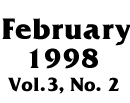



|

| |

| ||
|
|
by Jesus M. Lopez
Magic the Gathering "Wild Cards" How can you play that card? Wow! That's a pretty good spell. It's worthless! Is it a cantrip? I think I'm going to use it! Whatta waste of deck space! Cool card! These were some of the comments I received in 1996 regarding the inclusion of Memory Lapse (Originally a Homelands Interrupt which for U1 targets a spell being cast and temporarily counters it by having it placed at the top of its casters library.) in my B/U Counter/Discard/Creature deck. 2 years later, this spell continues to cause arguments on its tournament level worthiness. This quirky card caught my attention immediately as a potentially useful card. I decided to stress test under tournament and non-tournament conditions and found some interesting results. Let's first examine the spell itself without the benefit of support spells. Memory Lapse is not a true counter but a delay spell. This by itself can win or lose a game. I have had situations where I have a large creature (Ishans Shade or Mahamoti Djinn) on the loose and a Memory Lapse or 2 in my hand with a true counterspell. This basically meant that I could delay my opponent a few times and then counter her. I usually won these encounters. On the down side I have Memory Lapsed a foe's 10 point Fireball and only delayed my fate. From a casting cost (1 blue and 1 other) perspective, it is pretty cheap and in the opening part of a duel can buy you time until you get enough mana out to begin using your real counters. The inexpensive casting cost certainly makes it appealing for mages venturing into the 5 or 4 color deck waters. However, as the game progresses and there are less cards in your hand Memory Lapse begins to lose its effectiveness. Its biggest failing, in my opinion, is the resource expenditure for a free play only to face the threat again. When playing Blue you want to stop spells on a 1 to 1 ratio minimally thus maintaining the threat/counter balance. The best way to maximize Memory Lapse by delaying and pseudo-countering in one shot which results in an even card exchange. An example of this is the Lapsing of a creature (delayed) that required a Dark Ritual (pseudo-countered) to be summoned. Another example occurs when your opponent is attacking you and casts an instant (i.e. Elvish Fury, Howl from Beyond) to overpower your stronger defender. Simply Lapse the Instant and kill (pseudo-counter) the creature. A more interesting use of Memory Lapse which results in the "counter" of a counter spell occurs when your attempted creature summons is met by a true counter (i.e. Dismiss, Spell Blast or Counterspell). What you do is Memory Lapse your creature summons in response to your opponents counter. His spell no longer has a target and fizzles. Next turn, you can attempt to recast your creature. A Memory Lapse for true counterspell is a pretty good exchange. Unfortunately you will not be able to count on maximizing Memory Lapse as mentioned above and should make other deck preparations to support this spell. Several complimentary spells come to mind immediately. Ray of Erasure (Hey, a real use for this card.) will send the Lapsed spell to the graveyard and allow you to draw an extra card during the next turn. You do give up 2 cards for 1 but have countered the spell. While not overly efficient this is an effective combination and it is fun to play. In one tournament game I ping-ponged (Lapsed-Ray) two of my opponents Serra Angels. A more cost efficient way of ping-ponging can be accomplished with the use of Millstones and Grindstones. The use of Vexing Arcanix (an Ice Age artifact which in short forces target player to guess the next spell in their library or it is discarded and they are hit with 2 damage. If they guess it what it is they get to keep it.) on your opponent during your turn with the threat of incoming Abyssal Specters (2/3 flyer which forces opponent to discard a card.) or Stupor (Force opponent to discard 1 cards at random and one of choice. . .) or even Disrupting Scepter (Artifact that forces a card discard) can give even the most formidable opponent heartburn. Another consideration when using Memory Lapse is the psychological impact of the spell. You may frustrate your opponent by having her repeat a sequence a couple of times before finally countering her. On the other hand she might just be thinking, "I can't believe this knucklehead is using that card." The final advantage I would like to discuss regarding the use of Memory Lapse is the advantage of knowing what is coming next. There is a saying that goes, He who is warned is half saved, so by knowing what is coming you can adjust accordingly. Unless of course, it is that 10 point Fireball that you just can't stop. So is Memory Lapse worth having in your deck? The jury is still out.
|